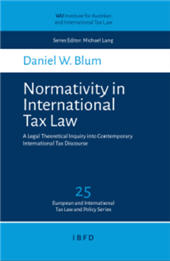Normativity in international tax law : a legal theoretical inquiry into contemporary international tax discourse
xvi, 634 p.
Includes bibliographical references (p. 557-634).
The set of rules applicable to cross-border situations found in both tax treaties and domestic tax law has, in recent years – and in an unprecedented manner – been the object of political, academic and legislative scrutiny. At the core of this global tax policy debate lies the ubiquitous claim that the current allocation of taxing rights between jurisdictions is “outdated”, “inappropriate” and “conceptually flawed”. Originally designed to be applied to a “brick and mortar” economy, digitalization – the dominant narrative – has rendered the system's reliance on physical criteria for allocating taxing rights meaningless. In response, the ongoing debate has produced a variety of reform proposals intended to overcome the shortcomings of the status quo.
Although the real-life changes accorded with digitalization are undisputed, the question remains as to why such change requires reforming the rules of international tax law. Looking at why reform is seen as inevitable, the book identifies three lines of argumentation on which essentially all reform proposals are based. Accordingly, substantial change is found to be a demand of fairness and economic efficiency. Moreover, the discourse is characterized by the recurring assumption that taxation requires justification.
Why, however, these claims carry any normative weight, i.e. why international tax law should be fair and efficient and why taxation requires justification, remains unanswered. Instead, their normative value and, hence, potential legal relevance is assumed, leading to the core hypothesis of this book, according to which the international tax discourse is characterized by a lack of consensus and transparency concerning the understanding of normativity employed in formulating arguments therein. By revisiting the key claims made in the debate from a legal theory perspective, the book situates them within the legal theoretical spectrum ranging from Kelsian/Hartian positivism to Dworkinian interpretivism and analyses the explanatory value of legal theory in establishing their legal validity. Winner of the 2022 Mitchell B. Carroll Prize (https://www.ifa.nl/research-awards/mitchell-b-carroll-prize. [Publisher's text]
1774260 characters
-
Información
ISBN: 9789087228064



 EPUB
EPUB